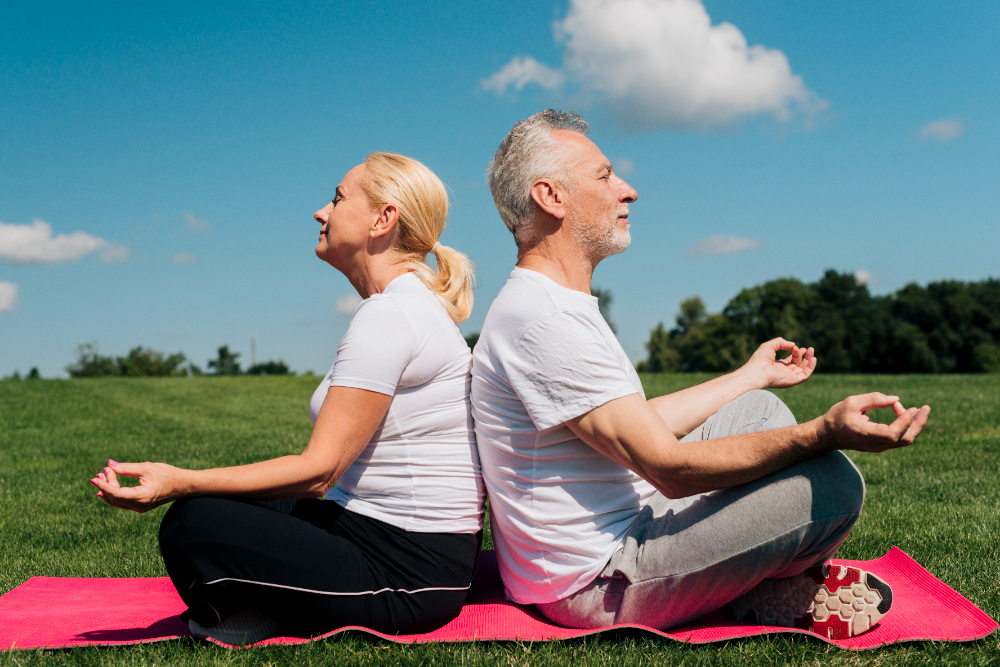Stress is one of the most common challenges of modern life. The demands of work, family, and daily life can create a mental burden that, if not managed properly, affects both physical and emotional health. In this context, meditation and mindfulness have gained popularity as effective tools to manage stress and regain balance.
Meditation is a structured practice aimed at training the mind, while mindfulness, or full attention, is the ability to be present in the moment, observing what is happening around us and within us without judgment. Both techniques, though different, complement each other to reduce anxiety, improve mental clarity, and enhance overall well-being.
The benefits of these practices are supported by science. According to a study published in the Journal of the American Medical Association (JAMA), practicing meditation and mindfulness for eight weeks can reduce stress levels by 23%, while also improving the ability to handle difficult emotions. These results show that incorporating these techniques into our daily routine is not only possible but highly beneficial.
What is Mindfulness, and How Does It Relate to Meditation?
Mindfulness is the ability to fully focus on the present moment, observing thoughts, emotions, and physical sensations without judgment. It helps to reduce stress by breaking the habit of worrying about the past or the future. Meditation, on the other hand, is a structured activity that aims to train the mind, often through techniques like breathing exercises or guided sessions.
While they are closely related, mindfulness and meditation are not the same:
- Meditation: A specific practice done at a set time and place. It often involves techniques such as guided meditation, mindful breathing, or body scanning.
- Mindfulness: A mental attitude or approach that can be applied anytime, during everyday activities like eating, walking, or working.
Both tools complement each other perfectly. Meditation helps train the mind to develop mindfulness, while practicing mindfulness in daily life reinforces the positive effects of meditation. Together, they not only reduce stress but also improve overall well-being by fostering mental clarity and a healthier relationship with emotions.
The Benefits of Meditation and Mindfulness for Stress
The meditation and mindfulness practices are powerful tools to manage stress, and their benefits are backed by scientific research. These practices not only calm the mind but also create positive and lasting changes in both body and mind.
1. Reduces the Stress Hormone (Cortisol)
Cortisol, the hormone our body produces in response to stress, can lead to anxiety, fatigue, and cardiovascular issues if levels remain high over time. A study by the American Psychological Association found that regular mindfulness practice reduces cortisol levels by 20%, helping the body maintain balance.
2. Improves Emotional Response to Difficult Situations
Meditation and mindfulness train the mind to respond calmly rather than react impulsively, making it easier to handle challenging situations. A study published in Frontiers in Psychology found that these practices strengthen brain areas associated with emotional regulation, such as the prefrontal cortex, enabling better emotional management.
3. Increases Concentration and Mental Clarity
Stress often leads to a scattered mind, making it difficult to focus. Mindfulness enhances attention and the ability to concentrate, clearing mental clutter. A University of California study found that just 10 minutes of daily meditation significantly improves working memory and mental clarity.
4. Improves Sleep Quality
Stress frequently disrupts sleep cycles, making it hard to rest properly. Meditation helps relax the mind and body, creating the conditions for deeper, more restorative sleep. A study published in JAMA Internal Medicine showed that people who practiced mindfulness meditation for eight weeks experienced better sleep quality and reduced insomnia symptoms.
How to Start with Meditation and Mindfulness
Incorporating meditation and mindfulness into your life doesn’t have to be complicated. These practices are accessible to everyone, even if you’ve never tried them before. Here are some practical tips to get started:
- Find a quiet and comfortable place: Choose a space where you feel relaxed and are unlikely to be interrupted.
- Start with short sessions: Begin with 5-10 minutes a day and gradually increase the time.
- Set a regular schedule: Consistency is key, so pick a time that works for you, like early morning or before bed.
- Try simple techniques:
- Guided meditation: Listen to instructions that guide you through the process.
- Mindful breathing: Focus on the rhythm of your breath.
- Body scan: Mentally scan your body to identify and release tension.
- Use helpful tools: Our Sensalus app offers guided mindfulness and meditation exercises tailored to your needs, making it easier to begin and maintain these practices.
Mindfulness Exercises to Reduce Stress in Daily Life

Mindfulness can be integrated into everyday activities, transforming them into moments of connection with yourself and your surroundings. Here are some examples:
- Mindful eating: Focus on the flavors, textures, and aromas of your food.
- Walking mindfully: Notice your steps, your breathing, and the environment around you.
- Mindful breathing during stress: Pause for 1-2 minutes to focus on your breathing, inhaling deeply and exhaling slowly.
Remember, it’s not about emptying your mind or achieving a mystical state. It’s about being present with kindness and without judgment. As a Buddhist proverb says: “You can’t stop the waves, but you can learn to surf.”
Start today, because every small effort counts. Your well-being is just a breath away. Download our Sensalus app and discover how these practices can transform your life, one step at a time.








